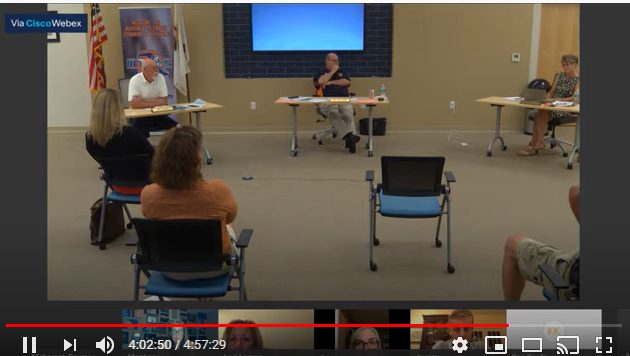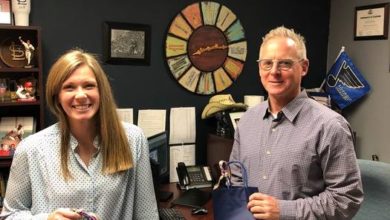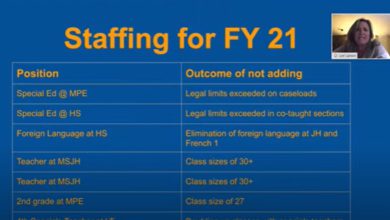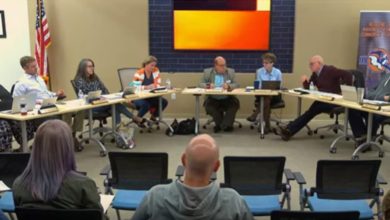Mahomet-Seymour Board votes down committee, willing to revisit with more information

An anti-racism resolution put together by Mahomet-Seymour alumni, and modified, but recommended by Superintendent Lindsey Hall did not receive a motion for approval by the Mahomet-Seymour School board on Aug. 3.
The resolution, along with a petition signed by approximately 650 alumni, was first presented to the board on June 22.
Whether or not the board adopted the alumni resolution, Hall said that she did feel it was important that the board make a statement about racism or anti-racism activities.
“So if this isn’t it, I would encourage it to continue to be explored,” Hall said.
As an administrator in the district for 11 years in the late 90’s and early 2000’s, Hall said that the district was not very diverse during that time, but in 2020 is it more diverse.
“While we still are a majority white school district, we do have more and more different types of diversity in our school district,” Hall said. “That includes different faiths, people of color, people in the LBGTQIA+ community and it’s important that the board from the top down creates a statement about diversity, inclusion and equity.
“The conversation maybe needs to continue after tonight.”
After public comment, which included two people opposed to the adoption of the resolution and three people in favor of the resolution, Board member Jeremy Henrichs and Lori Larson contributed statements.
“This board is faced with an important decision this evening,” Henrichs said. “It’s been presented with an anti racism resolution. It seems that this would be an easy choice. I think all of us would agree that racism is evil. And that all individuals have inherent value, regardless of their external characteristics. What complicates this matter is an identity crisis. Too many people believe their identity is rooted in these external characteristics: success in school, in success in music or sports, one’s image on social media, social status, one’s occupation, money, or power, and I could go on with many more things.
“None of these things provide any inherent value to the individual. My message to any students who are listening tonight. You are so much more valuable than any of these temporary things. You are a uniquely gifted and talented individual created by God. This is your identity. Ultimately, this is what gives value to your life, and no one can take that away.
“Our Declaration of Independence succinctly describes the inherent value of the individual. It reads: ‘We hold these truths to be self evident that all men are created equal, that they are endowed by their Creator with certain unalienable rights that among these are life, liberty, and the pursuit of happiness.’ What makes these traits self evident? What is the basis for equality? Where do these values come from? Are they solely the product of man’s intellect, or social or cultural evolution? Our founding fathers had it right: these truths are self-evident because they’re endowed by our Creator.
“America’s more than a nation. It is an ideal. It is this ideal that has given freedom to many, not only in America, but across the globe. This has been an imperfect process, but the progress of freedom cannot be denied. I believe that America at its core is good when it espouses to follow those founding principles.
“You might be asking what does this have to do with an anti racism resolution? The resolution that is being recommended for tonight has very little positive to say about America, its people, and especially the people of this school district and community. It uses characters such as implicit bias, systemic racism, power and privilege. The premise of this resolution is that we all have an illness, of which we are completely unaware while it invades every aspect of our lives. This includes our institutions, our words, our actions and our private thoughts. It’s an illness that’s seen in every conversation and wayward glance, no matter what your intentions may be.
“In fact, your intentions have no standing. What matters is the perception of someone who predetermined your intent based on the group or class you are identified with. The only remedy is to admit to this illness and consent to re education. This re education is presented by those who apparently do not possess the illness. They hold the truth, and you may choose to freely submit to their prescribing remedy, or be bludgeoned if nearly until you conform.
“I would prefer to proceed in a more positive direction, using terms such as humility, grace, forgiveness and love. We are humbled and need forgiveness because we have all fallen short. As a result, we are all in need of grace. This gracee has been extended so that we might extend it to others. In humility, we can also love unconditionally by seeking to place the needs of others before our own needs. Realizing that we have inherent value because we have been uniquely created in the image of God, why can’t we all prescribe to the inclusive statement, “love your neighbor as yourself?” Wouldn’t this be a better way of celebrating our diversity and resolving our differences?”
Larson added that she has been a social worker over 20 years. In working in various districts, including Mahomet-Seymour, Larson said she takes a lot of pride in running for school board for what she felt were the right reasons.
“Every single person, when we got on the board, we took a code of conduct,” Larson said. “I bring mine every time. I do this in my professional life, too. But the very first thing it says is I will represent all school district constituents honestly and equally and refuse to surrender my responsibilities to special interest or partisan political groups.
“And it hurt that someone would write a document and put in it that it is the ‘unequivocal belief of the Mahomet-Seymour Board of Education that systemic racism in American society is real.’
“I don’t want to let other people speak for me. I was elected to speak for the majority of the people, and it was hurtful to me that someone would come in and put a document together and say you must adopt it and this is what you need to do.
“We have anti-bullying policies in our school that we have for our kids, and we want those to be executed. And I am more than happy, and I appreciate the framework, and I want people to be treated fairly.
“I brought character counts to this district in ‘97, which is a national curriculum. It starts with being kind and caring and respectful. We’ve gotten away from that, probably because we have so many other things that we need to cover.
“But I think that getting together and having dialogue with community members, and staff and people that teach these kids is important rather than having a special interest group come in and tell us what to do.”
Board member Meghan Hennesy moved “that the Board of Education create an inclusion and social justice committee that will include parents, teachers and board members and focus on actionable tasks to make a more inclusive and accepting culture in Mahomet-Seymour.”
Hennesy’s vision included a committee that would begin in August, would engage the community and be tasked with reporting to the board monthly.
Board member Merle Giles said that the community dialogue was a much better approach to the topic rather than a one-time statement.
“What we’ve got to have is behavior, and not just a statement,” he said.
Larson wanted to make sure that the staff had a place in that committee, and liked that it would come to the board.
“I feel much more comfortable talking about something as community engagement with the board and the staff than having something be directed to us.”
Board member Max McComb said that the foundation that Hall and Director of Instruction Nicole Rummel had laid over the last three years, which has included conversations with University of Illinois School of Social Work’s Dr. Kevin Tan and Dr. Janet Carter-Black, was meant to address racism through curriculum changes and training.
“It is something that is committed to impacting the culture of the district and helping us get better at diversity and anti-racism,” he said.
Larson said that the work that has been done so far has been as anassessment of where the district is and how it can grow.
McComb asked if the committee would be something that would help the effort put forth by the administration or if it would be a place to start over from scratch.
“I think that this, in my mind, would be a board-level committee,” Hennesy said. “It would certainly work in combination with what the district administration has done internally for staffing. This would provide more of a mechanism for communication and discussion for community members. That would include staff, but it would be used by the board to enact and access policy in more effective ways that then might translate down into different procedural changes.
“But until we get down into that work, I think it’s difficult to know where that would go.
“This is a different segment of focus and engagement.”
Henrichs said that he would like to see plans written out so that the board could see more details about what the committee would be responsible for, what it would be charged with and what its constraints are.
Henrichs, Giles and Larson said that they felt the committee needed to be explored more prior to accepting the committee as part of the board.
Hennesy disagreed.
“I’m approaching this as our community members have already come and asked our board for help,” she said. “I would like to form a committee that is solely focused on helping them and listening to them. I don’t want to pre-prescribe what we expect to get out of this before we actually understand what they are asking us for help on.
“I think what I have heard through the communication that we have heard thus far, through the communication that I’ve had in person with people is that people are asking us to hear them and to understand their stories. To pre-prescribe some kind of outcome limits our ability to effectively listen and be nimble enough to make cultural change in this district.”
McComb said that he’d like to know the numbers of people on the committee and what the structure would look like, who is involved and how do they get involved.
Rummel said that she thinks it’s important to get community involvement, and that’s why the district had scheduled three town halls in the fall months. She said it is important to hear people’s voices while also having that conversation led by an expert.
Hall said she agreed with Rummel.
“I don’t disagree with forming a different committee, but I do think it is important to not prescribe the outcome of the work that that committee would do, but more the parameters within which it will work.”
Hall said the goal of the town halls was to be inclusive, to hear from as many people as possible and that a committee would limit the number of voices. She said that each task is not mutually exclusive.
Board member Colleen Schultz said that it’s important to just get the ball rolling.
Board member Ken Keefe said that the operation of the committees are already prescribed in Board Policy 2:150.
“The School Board may establish committees to assist with the Board’s governance function and, in some situations, to comply with State law requirements. These committees are known as Board committees and report directly to the Board. Committee members may include both Board members and non-Board members depending on the committee’s purpose. The Board President makes all Board committee appointments subject to Board approval. Board committee meetings shall comply with the Open Meetings Act. A Board committee may not take final action on behalf of the Board – it may only make recommendations to the Board.”
“I don’t know what other guardrails you’re wanting, other than what is provided already,” Keefe said.
Henrichs also wanted to know how the committee improves the outcomes in educating the students.
“We can do a lot of things, but our primary goal is to give the finest education to our students. How does this contribute to that?
“And number to is, we already have trouble getting through board meetings, and are we adding more things to an already crowded agenda that we have trouble giving time to?”
McComb asked more about the objectives of the committee.
“Focus on actionable tasks to make an inclusive and more accepting culture in Mahomet-Seymour,” Hennesy said.
McComb said that the plan that Rummel has in place has the goal of accomplishing that objective.
Hennesy said that the community asked for board-level action, and she believes that it is important enough for that. The standing board-level committee would not take away from the district-level initiatives.
“That’s two different sets of eyes and thought processes,” she said. “I think both can provide a strengthened and robust approach to this problem.”
Keefe encouraged the board to take some action for the community rather than “punting” the issue forward.
McComb took issue with the idea that the board is “punting” this down the line. Instead, he and Larson said that this is the first time that they’ve had to discuss the issue at the board-level and that the district has been working for three years to create a plan.
He said that the district has a “pretty good plan” to address what needs to be done.
McComb, along with Larson, Henrichs and Giles voted down the committee in the end, but McComb said that he’d be willing to entertain a committee proposal with more detail and structure.
Rummel said that teachers gained access to a diversity website this summer.
“There’s just a mindset by some folks that we’re not doing anything positive to address these concerns, and I take exception to that, we are, in my opinion. I understand that there are folks that think we need to take some kind of monumental action this evening, but what I really want to do is make sure that what we do helps address the situation to make things better.”
Giles said board-level attention to the topic is appropriate.
Giles amended the motion to be an exploratory committee instead of standing. That motion did not receive a second.
He also wanted to know how long the committee would last.
LaShunda Glover, whose children were subject to the n-word being spoken repetitively during the reading of To Kill a Mockingbird, said, “we already know that you don’t want to address racism. It’s clear that you don’t want to address racism.
“Do you not believe that racism exists? Do you not believe that racism exists in Mahomet? Do you not believe that racism exists in Mahomet’s school system? Do you not believe my children are not affected by this school system? This is terrible.
“Mahomet is the best place to start this, let’s keep the conversation going. Lets get it moving, do something. Just something. That was a great suggestion to start a committee.
“You want to know when it’s going to end; that’s not okay. You’re trying to end it before you get it started.”
Maggie Kinnamon thank Hall for her comments in the beginning.
“I just can’t understand what would be objectionable to forming a committee. I guess I just can’t understand what would be wrong about that? It is absolutely a legitimate next step. This just signifies that you’re wanting to stall more.
“Why not just say yes we are willing to form a committee?”
Larson said that she did not want to be forced to make a decision after everything just comes out.
“I don’t just serve myself, I serve the people of the community. It is clear what your expectations are through this supplemental material. One of the concerns I have is that you are asking me to make a decision without seeing how the plan that we have in place would be executed.
“With all due respect, I have committed my life to working with people of different cultures in Champaign County when I lived there and being an instructor at the university, and being throughout the school in the county; not this one because I can’t work here; but I mean, it is hurtful to have that said it is on my heart that we do the right thing the right way. And people call me all the time, they put it out there and I want to show people that I am listening to what they say.”
Henrichs said that the four board members weren’t disagreeing to a committee, they just wanted more information.
“I don’t see what’s wrong with asking for more information,” Henrichs said. “We aren’t saying no to anything tonight.”
Glover chimed back in, saying that forming a committee is not asking the district to commit to anything except to hear what people have to say.
“The committee will report to you and you will still have the chance to make the decisions,” Glover said.
Schultz asked who was on the diversity committee that had already been established by the district.
Rummel said, “I just want to be clear: we had a lot of discussions when I was meeting with the faculty at the U of I, in the school of social work and with Dr. Carter-Black in when and how we wanted to form that committee. And it was recommended that we form the committee after the town hall meetings so we would know what we would be working towards and we could get the community members, not only those who wanted to be on the committee, but really recruit some others who may be more reluctant to be a part of that committee because of their past experiences within the district.”
The recommendation, according to Rummel, was that in doing so, everyone would be on a level playing field when the committee started.
“Who is determining what is going to happen at the town halls and how those are going to run,” Schultz asked.
Rummel replied that she has been working with Dr. Tan for three years, and he, according to Rummel, he and Dr. Carter Black was going to facilitate the town halls.
“They are the experts, they are social workers and experienced in doing that,” Rummel said.
Schultz said, “I feel like we need to move forward, and if we’ve been working on it for three years, and we still don’t have the committee formed to talk about it. I just want us to move forward so that we can address the things that we’ve heard.
“When I heard what people said, it broke my heart. There are so many people who have come and talked about how they’ve been hurt. It doesn’t feel like, in my opinion, we’ve been having a loving response to people who are expressing to us their hurt.
“I want to be able to create a mechanism that can address that. A committee doesn’t tell anyone what to do, it doesn’t make any decisions, it says we want to listen and think about what some of the possibilities are for solutions.”
Schultz said that the board policy already covers the roles of board committees.
Giles also wanted to know how long the committee would last.





